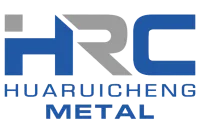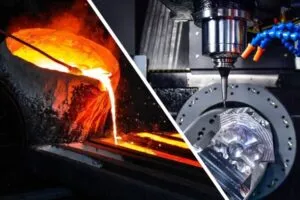Many wonder if 7075 is harder to machine than 6061. Both alloys are widely used in different fields. Knowing how they machine is key for those working with 7075 aluminum or 6061 aluminum. This piece will look into each alloy’s traits, discuss what makes machining hard, and offer tips for your projects.
Key Takeaways
- Distinct differences exist between 6061 and 7075 aluminum alloys.
- Machinability is a key factor to consider for manufacturing processes.
- Specific applications favor one alloy over the other based on properties.
- Tool selection and cutting parameters affect machinability substantially.
- Understanding material hardness helps optimize machining techniques.
Introduction to Aluminum Alloys
Aluminum alloys are key in many industries. They are strong, light, and resist corrosion well. These alloys vary in their aluminum properties based on their makeup and how they’re made. Knowing the types of aluminum alloys helps pick the best one for a job.
Aluminum alloys are mainly wrought or cast. Wrought alloys are shaped by rolling or extruding. Cast alloys are molded. Both have unique strengths and uses. For example, 6061 is versatile, while 7075 is very strong.
Each aluminum alloy has its own perks. 6061 is great for welding, while 7075 is strong. These traits matter a lot in fields like aerospace, cars, and building. The right alloy can make a big difference in how well something works and lasts.
| Type of Aluminum Alloy | Characteristics | Applications |
|---|---|---|
| 6061 | Good corrosion resistance, medium-to-high strength, weldable | Aerospace, automotive, structural components |
| 7075 | High strength, low weight, less corrosion resistant | Aerospace, military applications, high-stress components |
Choosing the right aluminum alloy is key for success in engineering and making things. Knowing about their aluminum properties helps make smart choices.
Understanding 6061 Aluminum
6061 aluminum is known for its strength, resistance to corrosion, and ease of use. These 6061 aluminum properties make it popular in many industries. It improves functionality and usability across various sectors.
Properties of 6061 Aluminum
The mechanical properties of 6061 aluminum are impressive. It has a tensile strength of 20,000 to 35,000 psi, ideal for structures. It also resists corrosion well, especially in saltwater environments.
Moreover, 6061 aluminum is easy to weld and shape. This makes machining simpler. It can handle different temperatures, keeping its strength and integrity.
Common Applications of 6061
The applications of 6061 aluminum are wide-ranging. It’s used in the car and plane industries for parts and frames. Its light weight and strength are key for making aircraft parts and marine equipment.
It’s also great for making bikes and ski poles. The ability to machine 6061 aluminum precisely allows for creating parts for many uses.
Understanding 7075 Aluminum
7075 aluminum is known for its strength-to-weight ratio. It has zinc as its main alloying element. This makes it very durable and strong. Knowing about 7075 aluminum’s features helps in using it in different industries.
Properties of 7075 Aluminum
The 7075 aluminum properties make it perfect for high-strength needs. It has:
- High Strength: It’s one of the strongest aluminum alloys.
- Fatigue Resistance: It keeps performing under repeated loads.
- Poor Weldability: It’s hard to weld effectively.
Its strengths outweigh its weaknesses in the right situations. But, it’s not good for welding.
Common Applications of 7075
The applications of 7075 cover many high-stress areas. It’s used in:
- Aerospace parts, like airframes and aircraft components.
- Military needs, where reliability is key.
- Sporting goods, like fast bikes and golf clubs.
These areas need high performance. Knowing this helps in machining 7075 aluminum well.
Is 7075 Harder to Machine Than 6061?
The debate on whether 6061 or 7075 aluminum alloys are harder to machine is common. To understand this, we need to look at their properties. 7075 is generally stronger and harder than 6061, making it more challenging to machine.
Hardness plays a big role in how easy these alloys are to machine. 7075’s higher hardness means chips form differently. This can lead to tools wearing out faster. This might mean you need to replace tools more often, increasing costs.
The table below shows key differences in properties that affect machining:
| Property | 6061 Aluminum | 7075 Aluminum |
|---|---|---|
| Hardness (Brinell) | 95 | 150 |
| Tensile Strength (MPa) | 310 | 570 |
| Machining Difficulty | Moderate | High |
While 6061 might be easier to machine, especially for large quantities, many factors come into play. Knowing these differences helps manufacturers choose the right alloy for their needs.
Factors Affecting Machinability
Knowing the factors that affect machinability is key for successful machining on aluminum alloys like 6061 and 7075. Each factor can greatly change the efficiency and quality of the machining. This, in turn, affects production costs and how quickly things get done.
Material Hardness
Material hardness differs among aluminum alloys and impacts machinability. Harder materials need stronger tools and longer cutting times. 7075 is harder than 6061, making machining it more challenging. This hardness can cause tools to wear out faster, needing more frequent changes to keep precision.
Tool Selection
Choosing the right tools is crucial for better machining. The tools must match the material hardness of the aluminum alloy. For example, high-speed steel tools work well for softer alloys like 6061 but struggle with harder 7075. The right tool materials and shapes can greatly improve results.
Cutting Speed and Feed Rate
Cutting speed and feed rate are key in machining. Changing these settings can greatly affect how well and fast you work. Faster cutting speeds can raise the temperature at the cutting edge, important for alloys with different hardness levels. Finding the right balance of speed and feed rate is essential for efficient material removal without overheating or tool failure.
| Machinability Factor | Effect on 6061 | Effect on 7075 |
|---|---|---|
| Material Hardness | Moderate, easier machining | High, more challenging machining |
| Tool Selection | Standard tooling sufficient | Specialized tooling required |
| Cutting Speed | Higher speed recommended | Careful balancing needed |
| Feed Rate | Moderate feed rates ideal | Lower feed rates preferred |
Machining Processes for 6061 and 7075
When it comes to aluminum machining, 6061 and 7075 alloys need different approaches. The right machining techniques are key for both speed and accuracy. Thanks to CNC machining services, working with these materials is now more precise and efficient.
CNC Machining Services Overview
CNC machining services are crucial for aluminum alloys. They use computer-controlled machines for complex parts with high precision. For 6061 and 7075, CNC machining makes intricate designs and tight tolerances possible. This technology has greatly improved machining techniques, cutting down on time while keeping quality high.
Comparison of Machining Techniques
The unique properties of 6061 and 7075 require different machining methods. Here’s a table showing some key aspects of various machining techniques for these alloys.
| Machining Technique | 6061 Aluminum | 7075 Aluminum |
|---|---|---|
| CNC Milling | Easily machined with standard tools. | Requires high-speed tooling to minimize wear. |
| Turning | Good results with conventional lathes. | Improved output with advanced CNC lathes. |
| Drilling | Effective with standard drill bits. | Better results with carbide drill bits and high RPM. |
| Lasering | Commonly used for decorative applications. | Precision cutting for intricate designs. |
CNC Parts and Their Importance
CNC parts are key in today’s manufacturing world. They help make products more precise and efficient. Made with Computer Numerical Control technology, they ensure accuracy and consistency.
As automation grows, knowing how important CNC parts are becomes more critical.
Defining CNC Parts
CNC parts are made with CNC machining. They are used in many fields, like aerospace and cars. This method saves time and reduces mistakes, improving quality.
Quality Control in CNC Manufacturing
Quality control is vital in CNC manufacturing. It makes sure parts are made to exact standards. Techniques like laser scanning and CMM inspections are used to check parts.
These steps help ensure CNC parts work well. They make customers happy and help projects succeed.
Challenges in Machining 7075 Aluminum
Machining 7075 aluminum comes with its own set of challenges. These are different from those faced with more common alloys like 6061. Knowing these challenges is key for manufacturers to improve their processes and stay within budget.
Increased Tool Wear
One big challenge with 7075 is the increased tool wear. Its hardness is great for some uses but shortens tool life. Tools used on 7075 need to be replaced or sharpened often. This leads to more downtime and messes up production plans.
Cost Implications
Machining 7075 aluminum costs more than softer alloys. It takes longer to machine, which means more labor and equipment costs. Also, special tools to handle 7075 are more expensive upfront. Here’s a table showing the financial differences between machining these two alloys:
| Aspect | 6061 Aluminum | 7075 Aluminum |
|---|---|---|
| Average Tool Wear | Low | High |
| Machining Time | Short | Long |
| Tooling Costs | Standard | Specialized |
| Labor Costs | Lower | Higher |
These costs show why picking the right material is so important. Understanding these points helps businesses plan better for production.
Choosing the Right Machining Shop
Finding the right machining shop is key to a successful aluminum project. The right choice can make a big difference in the quality and efficiency of your project. Knowing how to compare different options will help you make a smart choice.
Evaluating Online CNC Service Providers
When looking at online CNC services, there are important things to check. First, look at their capabilities. This means checking if they can work with different materials, what technologies they use, and if they can handle complex designs. Also, reading what other customers say can tell you a lot about their reputation and reliability.
Factors to Consider When Selecting a Machining Manufacturer
It’s also important to do a thorough evaluation of machining manufacturers. Here are some key things to look at:
- Quality Control Policies: Look for manufacturers with strict quality control to ensure your product is perfect.
- Lead Times: Knowing their production times helps you plan your project better.
- Customer Support: Good customer service is important for solving any issues during production.
- Pricing: While the cheapest might seem good, think about the value and quality of service you get.
By carefully looking at these factors, you can find a machining shop that fits your needs and helps your project succeed.
Advantages of Each Aluminum Alloy
Choosing the right aluminum alloy for your project is key. Knowing the benefits of 6061 and 7075 aluminum is important. Each alloy has unique advantages for different needs and uses.
Pros of 6061 Aluminum
6061 aluminum is a favorite among engineers and manufacturers. It has many benefits. Here are some:
- Versatility: 6061 can be easily shaped, cut, and welded. It’s great for many uses.
- Corrosion resistance: This alloy fights off corrosion well. It makes products last longer.
- Lightweight: 6061 is light but strong. It helps keep projects light without losing strength.
- Good mechanical properties: It has a strong strength-to-weight ratio. This makes it perfect for building things.
Pros of 7075 Aluminum
7075 aluminum is known for its strength. It’s great for high-stress jobs. Here’s why:
- Superior strength: 7075 is very strong. It’s often used in aerospace and military fields.
- High fatigue resistance: It can handle repeated stress well. This makes it good for jobs with lots of stress cycles.
- Durability: It’s very durable under extreme conditions. This ensures it works well in tough situations.
- Low thermal expansion: 7075 has low thermal expansion. This helps it keep its shape better.
Summary of Machinability Comparison
The comparison between 6061 and 7075 aluminum shows their different machining qualities. Each alloy has its own strengths, making them good for different uses in many fields.
6061 aluminum is great for shaping because it’s easy to form and has good strength. This makes it easy to cut and shape, which is why it’s often used. On the other hand, 7075 aluminum is stronger but harder to machine because of its hardness.
When it comes to choosing between 6061 and 7075, it depends on what you need. 6061 is better for projects that need precision and a smooth finish. But if you need something stronger, 7075 might be the better choice. This choice is important because it affects the success of your project.
Conclusion
The comparison between 6061 and 7075 aluminum alloys shows their differences. 6061 is known for being easy to machine, versatile, and affordable. On the other hand, 7075 is stronger but harder to work with during machining.
When deciding between 6061 and 7075, consider what your project needs. If you need something strong and light, 7075 might be better, even if it’s harder to machine.
Knowing the pros and cons of each alloy helps engineers and manufacturers make better choices. This ensures they pick the right material for their needs. The right choice can improve performance and efficiency in production.


















